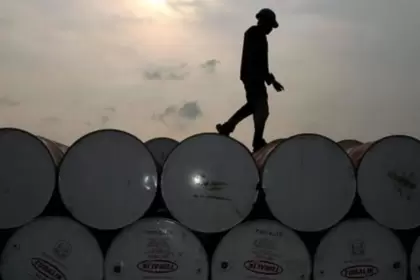La Organización de Países Exportadores de Petróleo (OPEP) prevé que el consumo de crudo seguirá aumentando en las próximas décadas, debido al crecimiento constante de la demanda energética, y hace hincapié en la importancia de enfocarse en la reducción de emisiones en lugar de restringir el uso del crudo.
Este último concepto está estrechamente ligado con lo que comúnmente se conoce como transición energética.
Haitham Al Ghais, presidente de la OPEP, señaló que el mundo lleva invertidos más de US$ 9,5 billones en costos de transición durante las dos últimas décadas y, sin embargo, la energía eólica y la solar sólo suministran algo menos del 4% de la energía mundial, mientras que los vehículos eléctricos tienen una tasa de penetración global total de entre el 2% y el 3%.
Las declaraciones de Al Ghais al Middle East Economic Survey tienen como contexto el conflicto bélico en Medio Oriente entre Israel e Irán, que podría anticipar un cambio importante en la política de precios del crudo para el segundo semestre de este año.
"El crecimiento constante de la demanda de energía impide que las alternativas puedan reemplazarlo en la medida necesaria. Existe una tendencia preocupante de narrativas que utilizan términos como el fin del petróleo, que tienen el potencial de fomentar políticas energéticas que aviven el caos energético", comentó.
La realidad es que muchas alternativas no pueden sustituir al petróleo a la escala necesaria, o son "inasequibles" (muy caros) en muchas regiones. La postura de la OPEP es no oponerse al fin de los combustibles fósiles pero sí a ponerle fecha porque considera que hacerlo "no es realista" debido a que, al menos hasta 2045, continuará aumentado la demanda.
Esta mirada contrasta con la proyección hecha por la Agencia Internacional de la Energía (AIE) que supone que la demanda de crudo alcanzará su punto máximo en seis años.
La AIE considera que el petróleo y el carbón tendrán un 'peak oil' de demanda alrededor de 2030 para después comenzar a descender, impulsado por las diferentes fuentes alternativas.
En su último informe el organismo internacional señaló que para encaminarse hacia limitar el calentamiento global a 1,5 °C, la inversión en energía limpia en las economías emergentes y en desarrollo fuera de China debe aumentar más de seis veces, de 270 mil millones de dólares actuales a 1,6 billones de dólares a principios de la década de 2030.
Y destacó que "la disponibilidad de financiación concesional -principalmente de instituciones internacionales de financiación del desarrollo- también tendría que triplicarse en este plazo".
"Casi la mitad de la inversión total en energía limpia durante los próximos diez años en las economías emergentes y en desarrollo fuera de China debe destinarse a proyectos solares y eólicos a gran escala, redes eléctricas y gastos en diseños de edificios y electrodomésticos más eficientes desde el punto de vista energético", detalló el documento.
Desde 2020, la inversión mundial en energías limpias aumentó 40%, alcanzando una cifra estimada de US$ 1,8 billones en 2023, pero casi todo el crecimiento se generó en las economías avanzadas y en China.
***
La visión completa (en inglés) de Haitham Al Ghais
It's About Reducing Emissions, Not Oil Demand
The pace at which global energy demand is growing means that alternatives cannot replace oil at the necessary scale writes OPEC Secretary General Haitham Al Ghais. Rather than calling for an end to oil, the focus should be on reducing emissions.
A recent report on oil demand by The Economist exemplifies a worrying trend of narratives that increasingly use terminology like "the end of oil" while simultaneously underplaying or omitting key details regarding current and future oil demand. Such assertions, despite all evidence to the contrary, are all the more dangerous given their potential to foster energy policies that stoke energy chaos. What if investments in supply fall as a result, but demand for oil keeps increasing, as we are seeing today?
Although the main goal of the Paris Agreement on climate change is to reduce emissions - not to choose energy sources - it feels like this has been forgotten, replaced by rigid narratives to reduce demand for hydrocarbons without thinking through the effects on energy security, socio-economic development, or reducing energy poverty.
These kinds of narratives forget that oil continues to be irreplaceable in fostering global prosperity and maintaining energy security. In this respect, Ed Conway was not exaggerating in 'Material World' - one of The Economist's best books of 2023 - when stating that the Oil Age "delivered humankind from much of the drudgery of manual labor... lifted incomes around the world... helped us live longer... and provides the chemicals from which we make the fertilizers that keep half the planet alive."
THE CENTRALITY OF OIL
It is sometimes easy to forget just how critical oil is to our everyday lives, but without it we would not have gasoline, heating oil, jet fuel, syringes, soap, computers, car tyres, contact lenses, artificial limbs, many types of medicine and much more. The fiberglass, resin and plastic needed to construct most wind turbines and the ethylene for solar panels would not exist either.
The reality is that the end of oil is not in sight. Oil continues to make up almost a third of the global energy mix today and global oil demand continues to rise. Last year, we saw global demand growth of around 2.5mn b/d, and OPEC and many other forecasting agencies see significant growth in the coming years too.
Suggesting that oil demand could peak by 2030, or even drop by more than 25% over the same time-frame, as some narratives allude to, overlooks what all energy sources can actually deliver and on what timescale, especially as 2030 is less than six years away.
OPEC research outlines how detrimental this could be for energy security when noting a staggering oil market deficit of over 16mn b/d between forecast rising global oil demand and supply by 2030 if investments into upstream activities stopped today. We do not believe that this makes for prudent energy-making policy.
Many narratives also fail to mention that scores of initial proposals for ambitious net-zero policies are increasingly being opposed across the world, as people begin to understand the true cost of these policies and their corresponding capabilities. People want affordable, reliable energy and lower emissions. They want stability.
TACKLING THE REALITY OF ENERGY POVERTY
The simple yet crucial fact also sometimes left out of these narratives is that the world needs much more energy, as all sources of energy will be needed simply to meet rising population growth and urbanization. By 2030 alone, over half a billion more people are expected to move into cities across the world as the global economy continues to expand. This is the equivalent of approximately 50 new cities the size of London.
It is important to remember that the non-OECD developing world will lead future energy demand growth. In this regard, Saudi Aramco CEO Amin Nasser recently noted that "despite representing over 85% of the world's population, these areas currently receive less than 5% of investments targeting renewable energy." It begs the question: how will the developing world's energy needs be met?
Billions of people are playing energy catch-up. We should remember that oil consumption in developing countries currently ranges from less than one to just below two barrels per person per year, compared to nine in the EU and 22 in the US.
In this regard, some narratives also neglect to mention the harsh reality of energy poverty, despite about 700 million people having no access to electricity and 2.3 billion lacking clean cooking solutions. Do all populations not deserve similar standards of living as the developed world? Is it acceptable that global efforts to meet the Sustainable Development Goal 7 target on affordable and clean energy are falling short?
The reality is that many alternatives cannot replace oil at the necessary scale, or are unaffordable in many regions. Indeed, the world has invested over $9.5 trillion in 'transitioning' over the past two decades, yet wind and solar still only supply just under 4% of the world's energy, while electric vehicles have a total global penetration rate of between 2% and 3%. Furthermore, significant challenges remain with regard to electricity grids, battery manufacturing capacity and critical minerals.
On critical minerals specifically, imbalances between reserves concentration and processing capacity present their own set of challenges, such as supply chain bottlenecks, price gyrations and geopolitical tensions. Additionally, mining is an energy-intensive activity, which runs today on hydrocarbons. In fact, studies show that final energy consumption in mining activities could increase more than five-fold by mid-century.
This is not to undermine the importance of renewables or electric vehicles - especially as their market share will increase and the world requires all energy sources and technologies to meet rising demand - but to highlight the scale of the energy demand challenges facing us, especially for those advocating for an end to oil.
That said, while ensuring that people have access to the products and services they need to live comfortably, the world must also take serious action to reduce emissions.
Towards this end, the oil industry is developing and investing in technologies like carbon capture utilization and storage, clean hydrogen and direct air capture. It is also improving operational efficiencies, as evidenced by around 50 major oil and gas producers at COP28 agreeing to curb methane emissions to near-zero by 2030. The industry is showing that it is possible to reduce emissions while producing the oil the world needs.
Against this backdrop, perhaps the next time we are driving our children to school, sitting in a hospital, or gazing at a wind turbine, let us recognize the critical role that oil continues to play even as there are calls for its untimely demise.
After all, the Paris Agreement is not about reducing oil demand; it is about reducing emissions. It is high time that all narratives accurately reflect this reality.







